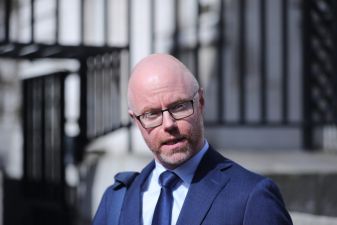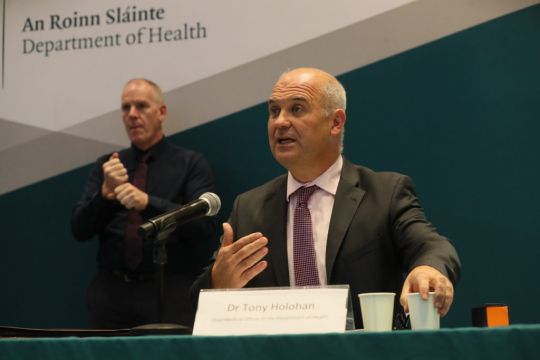Covid-19 case numbers are “at best stable and perhaps increasing” ahead of an “ambitious” easing of restrictions, according to public health officials.
Four further deaths and 545 cases of Covid-19 were confirmed by the National Public Health Emergency Team (Nphet) on Friday afternoon.
Of the cases notified today, 77 per cent are under 45 years of age and the median age is 29 years old.
There are 264 cases located in Dublin, 58 in Kildare, 50 in Cork, 29 in Donegal and 28 in Galway. The remaining 116 cases are spread across 21 other counties.
What’s going to happen in next couple of weeks, we can’t say with any certainty
Professor Philip Nolan, chair of Nphet’s epidemiological modelling advisory group, told a media briefing that current case numbers are “at best stable and perhaps increasing.”
There is “significant uncertainty” regarding the future trajectory of the disease and Nphet has noted “unusual” case counts over recent days.
“What’s going to happen in next couple of weeks, we can’t say with any certainty,” Prof Nolan said.
Prof Nolan said the current growth rate of the virus was estimated to be between zero per cent and +2 per cent per day.
The R or reproductive number of the virus is now above 1, he said, with a formal estimate putting it somewhere between 1 and 1.2.
It remains possible that the country can get the R number back below 1, Prof Nolan said.
'Time to move on'
Chief medical officer, Dr Tony Holohan, said Nphet agreed that “now is the time for us to move on” in terms of exiting lockdown.
The easing of restrictions was “ambitious but cautious in that ambition,” Dr Holohan said, with a four-week interval between reopening phases in May and June to assess the impact.
With approaching 30 per cent of the population having received a first dose of a Covid-19 vaccine, this “changes [the] calculus” on reopening and restrictions, he added.
Dr Holohan expressed concern that “some areas are in a more precarious position than others.”
Donegal has an “extremely concerning” incidence rate of 295 cases of Covid-19 per 100,000 population, while the national incidence rate is 125 per 100,000.
“We are calling on community leaders in areas such as Donegal, where the virus is still circulating at dangerous levels, to encourage the people there to stick with the public health measures,” Dr Holohan said.
Reopening risk
Prof Nolan described national reopening plans for the next few weeks as “low-to-medium risk”, based on public adherence to restrictions.
Nphet modelling sees the country’s R number increase to 1.25 from May 10th as restrictions ease, and then to 1.5 from June 7th as the country reopens further.
Prof Nolan said this increasing R number “produces some increase in case numbers,” but with exact numbers in a “really quite wide” range of uncertainty.
This “range of uncertainty” will be defined by how effective vaccines are at interrupting onward transmission of the virus, and also on what each individual chooses to do and how careful they are, Prof Nolan said.
The figures come as the number of Covid-19 patients in public hospitals fell to its lowest in more than 200 days last night, with 136 people hospitalised.
Thursday evening saw the Government confirmed a major reopening plan for the country into the summer months, following the advice of Nphet.
A raft of Covid-19 restrictions will ease from May 10th, with the reopening plan to proceed in two main phases over the course of May and June.
Higher-risk activities such as indoor hospitality are to be considered at the end of June, and Taoiseach Micheál Martin has raised the possibility of indoor pints in Ireland and holiday travel within Europe later in the summer.
However, Mr Martin also said the Government would not be afraid to intervene and change the plan for easing Covid restrictions if worrying trends emerge.
Vaccine rollout

Meanwhile, the online portal for vaccine registration will open next week for people aged over 50.
The online registration process for those aged 60 to 64 opened last week, and those aged 65 to 69 started to receive their first doses this month.
People in their 40s may be vaccinated in parallel to those in their 50s, Minister for Health Stephen Donnelly has said.
The Department of Health and the State's vaccine taskforce are currently reviewing the rollout plan due to supply issues and a change in advice on the Johnson & Johnson and AstraZeneca vaccines.







